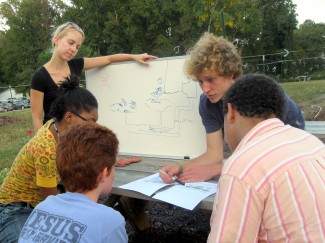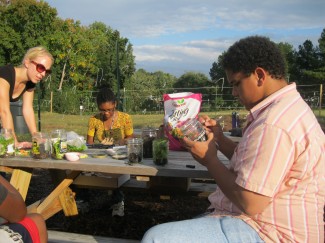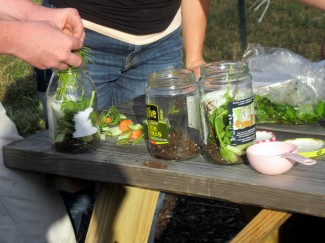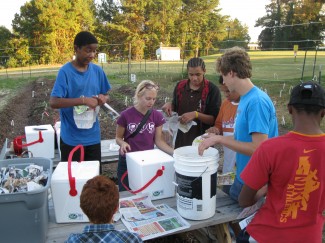For the fourth year in a row, the Caldwell Fellows program has had a team assigned to the Food Shuttle Farm for their Sophomore Seminar, where the team members work together to live out their guiding principles of servant leadership, principled reflection, personal development, rigorous integrity, and academic excellence.
Food Lion Partnership Makes a Difference in the Lives of Neighbors Throughout Central NC
For the last 16 years, Inter-Faith Food Shuttle has partnered with Food Lion and the Food Lion Feeds Charitable Foundation to create a hunger free community in central North Carolina. This partnership has made a difference in the lives of neighbors throughout the region, as the grocery store chain and its charitable foundation have provided funding to a variety of Food Shuttle program initiatives over the course of the last year in excess of $75,000—and that support continues to grow.
Enthused by Enthusiasm: NCSU Soil Management Students Partner with Inter-Faith Food Shuttle Farms and Gardens
This semester, students from Dr. Julie Grossman’s Service Learning for Sustainable Soil Management class (SSC 428) at North Carolina State University (NCSU) have been working with a couple of Inter-Faith Food Shuttle’s farms and gardens programs teaching youth about soil science. Students Alyssa Degreenia, Will Hildreth, and John Galloway worked with the IFFS Youth Farmer Training Program (YFTP) apprentices, teaching them about soil carbon. Above, they watch proudly during the YFTP graduation ceremony on the farm.

The NCSU students combined both lecture and hands-on teaching methods to convey their knowledge to the youth involved, but found that it was their enthusiasm and passion for the topics at hand that inspired and motivated the youth the most.
This project not only benefitted the youth by building their knowledge about composting, vermicomposting, carbon cycles, soil organisms, and potential careers in agriculture, but also allowed the NCSU students to learn how to share their own knowledge and enthusiasm and hone their leadership skills. By figuring out how to effectively transmit what they know to others, they were able to hone in on their own passions as well.
Part of Inter-Faith Food Shuttle’s mantra is “Give a man a fish. Teach a man to fish. Stock the pond for all.” We believe in the power of education in so many ways, including teaching folks how to grow their own food, building self-sufficiency with information and resources , and providing learning opportunities that spread this transformative knowledge throughout the community. This partnership with Dr. Grossman’s class at NCSU is a vital part of this community of knowledge sharing. It is only by working together that we can truly create a hunger-free community and transform the local food economy into a more healthy, just, sustainable, and secure food system that feeds everyone healthy, nutritious food.
Part 3: Gardening Class for Teens at Parrish Manor
Students from NC State University (NCSU) have partnered with Inter-Faith Food Shuttle to conduct a gardening class for teens in the community garden we manage at Parrish Manor, meeting once a week from Sept. 27 - Nov. 15. On the day I visited, NCSU Soil Science students Natalie and Jacob were teaching a lesson on compost. They brought with them a bag of un-enriched potting soil and some finished compost. As an experiment, they asked the class participants to fill 6 mason jars with the following: Potting soil + vegetable scraps; Potting soil + paper scraps; Potting soil + plastic scraps; Compost + vegetable scraps; Compost + paper scraps; Compost + plastic scraps.
The teens in the class then talked about which material might break down the fastest, considering factors like the amount of micro-organisms present, the amount of nitrogen, etc. Their hypotheses: The vegetables will break down in compost fastest, and the plastic in potting soil will break down slowest. They’ll monitor the jars in the coming weeks to see if their hypotheses are correct.
Natalie and Jacob also taught the class about waste management and jobs that involve waste treatment and composting. They began the lesson by asking the class to draw where they think waste from our toilets goes after it’s flushed, and ended by highlighting ecological waste water treatment practices like those in the EcoVillage of Findhorn, Scotland. They discussed job opportunities in composting, such as vermicomposting mico-enterprises, where such nutrient-rich worm castings are sold as natural fertilizer, and composting operations like CompostNow (another IFFS partner). It was clear to me these teens were seriously interested in this stuff –Kiara, who also works in the garden, is even thinking about changing her major at Wake Tech to something involving agriculture!
The following week, they nailed together compost bins for the garden, and the teens got to create their own vermicomposting bins!
Fun fact: Did you know that worms can eat twice their body weight in one day? Wow!
See what else has been happening in the Parrish Manor community and community garden in Part 1and Part 2 of this series.











